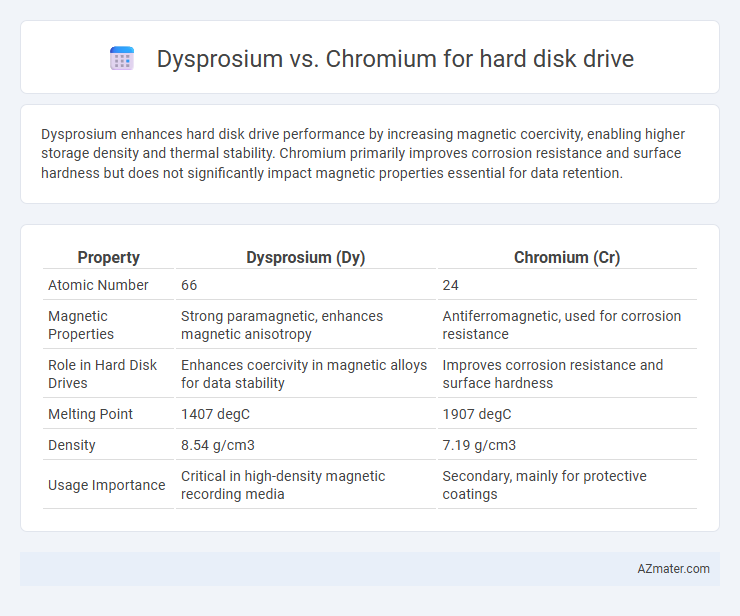Dysprosium enhances hard disk drive performance by increasing magnetic coercivity, enabling higher storage density and thermal stability. Chromium primarily improves corrosion resistance and surface hardness but does not significantly impact magnetic properties essential for data retention.
Table of Comparison
| Property | Dysprosium (Dy) | Chromium (Cr) |
|---|---|---|
| Atomic Number | 66 | 24 |
| Magnetic Properties | Strong paramagnetic, enhances magnetic anisotropy | Antiferromagnetic, used for corrosion resistance |
| Role in Hard Disk Drives | Enhances coercivity in magnetic alloys for data stability | Improves corrosion resistance and surface hardness |
| Melting Point | 1407 degC | 1907 degC |
| Density | 8.54 g/cm3 | 7.19 g/cm3 |
| Usage Importance | Critical in high-density magnetic recording media | Secondary, mainly for protective coatings |
Introduction to Dysprosium and Chromium in Hard Disk Drives
Dysprosium and chromium serve distinct roles in hard disk drives, with dysprosium primarily used in the manufacturing of neodymium-iron-boron (NdFeB) magnets to enhance magnetic performance and thermal stability. Chromium is often incorporated into hard disk drive platters as a thin layer to improve corrosion resistance, surface hardness, and wear properties. The introduction of dysprosium extends the operating temperature range of magnets, while chromium coatings ensure data integrity and longevity by protecting the storage medium.
Chemical Properties Relevant to HDD Applications
Dysprosium exhibits a high magnetic anisotropy and thermal stability, making it essential for enhancing the performance of hard disk drive (HDD) magnets under elevated temperatures. Chromium's corrosion resistance and ability to improve the coercivity of magnetic layers contribute to the durability and data retention of HDDs. Both elements play crucial roles in optimizing magnetic recording media, with dysprosium primarily boosting thermal stability and chromium enhancing magnetic layer coercivity and corrosion resistance.
Magnetic Characteristics: Dysprosium vs Chromium
Dysprosium exhibits superior magnetic anisotropy and higher coercivity compared to Chromium, making it more effective in stabilizing magnetic grains in hard disk drives under high-temperature conditions. Chromium enhances corrosion resistance and grain boundary segregation but offers lower magnetic stability and coercivity than Dysprosium. The integration of Dysprosium in magnetic alloys significantly improves thermal stability and data retention, crucial for high-density storage applications.
Role in Read/Write Head Performance
Dysprosium enhances read/write head performance in hard disk drives by improving the magnetic anisotropy of the thin film materials, leading to better thermal stability and higher data density. Chromium serves primarily as an underlayer or buffer layer, optimizing the microstructure and texture of magnetic films, which indirectly supports head performance by reducing noise and enhancing signal clarity. Dysprosium's ability to increase coercivity makes it crucial for maintaining reliable data storage at ultra-high recording densities compared to Chromium's structural role.
Durability and Reliability in Storage Devices
Dysprosium enhances the durability and reliability of hard disk drives by significantly improving magnetic coercivity, which safeguards data integrity against thermal fluctuations and mechanical stress. Chromium's role primarily involves enhancing the toughness and corrosion resistance of disk platters, contributing to longer device lifespan under operational wear. Combining dysprosium's magnetic stability with chromium's physical resilience creates storage devices that maintain performance and data retention over extended periods.
Cost and Resource Availability Comparison
Dysprosium is significantly more expensive and less abundant than chromium, leading to higher material costs in hard disk drive manufacturing. Chromium is widely available and cost-effective, making it a preferred choice for enhancing magnetic properties without drastically increasing expenses. Resource scarcity of dysprosium poses supply risks, whereas chromium benefits from stable global supply chains.
Thermal Stability and Resistance
Dysprosium enhances hard disk drive thermal stability by increasing the coercivity of magnetic materials, which prevents data loss at elevated temperatures. Chromium, commonly used in magnetic alloys, improves corrosion resistance but offers less thermal stability compared to Dysprosium-enhanced compounds. The integration of Dysprosium in rare-earth magnetic layers significantly extends high-temperature performance, making it critical for advanced hard disk drives requiring durable magnetic retention.
Environmental and Sustainability Considerations
Dysprosium is critical in hard disk drives (HDDs) due to its role in enhancing the magnetic performance of rare-earth magnets, which improves data storage density and durability while posing environmental challenges through intensive mining and limited recyclability. Chromium, used mainly as a coating material to provide corrosion resistance and wear protection on HDD components, has a lower environmental impact and is more readily recyclable compared to dysprosium. Sustainable HDD manufacturing increasingly focuses on minimizing dysprosium use due to its scarcity and high environmental footprint, promoting recycling and alternative materials to reduce ecological damage.
Industry Trends and Future Prospects
Dysprosium is increasingly favored in hard disk drive (HDD) manufacturing due to its superior ability to enhance the magnetic anisotropy of neodymium-iron-boron (NdFeB) magnets, enabling higher data storage density and thermal stability compared to Chromium. Chromium, while historically used for corrosion resistance in HDDs, is being progressively supplanted by rare earth elements like Dysprosium that improve performance in emerging high-capacity storage solutions. Industry trends indicate a growing shift towards Dysprosium-enriched magnets propelled by surging demand for advanced data storage technologies and the push for miniaturization in consumer electronics and enterprise servers.
Conclusion: Choosing the Right Element for Advanced HDDs
Dysprosium offers superior magnetic anisotropy and thermal stability compared to chromium, making it essential for high-density and high-performance hard disk drives (HDDs). Chromium provides benefits in corrosion resistance and cost-effectiveness but lacks the magnetic properties necessary for advanced data storage technologies. Selecting dysprosium enhances HDD durability and data integrity, critical for future generation storage solutions.

Infographic: Dysprosium vs Chromium for Hard disk drive
 azmater.com
azmater.com